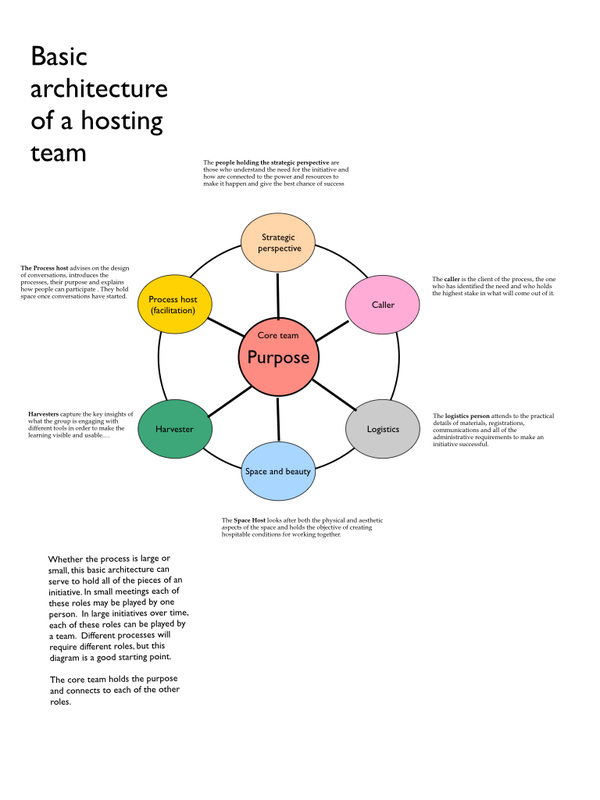Working Together to Create a ‘Container’
How are we going to behave together in pursuit of our purpose?
When we enter an inquiry where we do not have ready or easy answers and we cannot see the obvious solution – we also enter “chaos” together. In walking the chaordic path together it is wise to start by creating the conditions that can help contain that chaos. - We call this creating a “container”. One fundamental way to create a container is to agree on how we want to work or “travel” together in pursuit of our goal. In other words we define some agreements or principles of co-operation.
Principles - when defined with clarity, conviction and common understanding - guide our pursuit of purpose. Developing them requires engaging the whole person, not just the intellect. Principles bind a community together and serve as a touchstone to remind us of how we have agreed to act and decide together around our purpose.
When we enter an inquiry where we do not have ready or easy answers and we cannot see the obvious solution – we also enter “chaos” together. In walking the chaordic path together it is wise to start by creating the conditions that can help contain that chaos. - We call this creating a “container”. One fundamental way to create a container is to agree on how we want to work or “travel” together in pursuit of our goal. In other words we define some agreements or principles of co-operation.
Principles - when defined with clarity, conviction and common understanding - guide our pursuit of purpose. Developing them requires engaging the whole person, not just the intellect. Principles bind a community together and serve as a touchstone to remind us of how we have agreed to act and decide together around our purpose.
|
Who Makes Up a Core Hosting Team?
Whether you are designing a single meeting or a long term initiative, a core hosting team is very important. Such a team forms early in the life of a project and holds the core of the work until it is no longer needed. No matter the scale, core hosting teams have a need for several different roles. In a small initiative, such as a one-off meetings, these role can be played by a single person. Sometimes the same person can play multiple roles. In larger scale initiatives: large conferences or extended change initiatives, these roles are often played by teams. Not all team members need to be on the core team, but every team need to have one person on the core team, connected to the purpose. . A Core Hosting Team is About Learning Together In such a team, everybody is learning, and continually seeking clarity together. Being clear about what you can contribute and what you can expect to learn will help the team to work consciously together in service of the people invited and the purpose. It is highly recommended to have seasoned people in the team who can help less experienced practitioners to deepen their understanding of this way of working through practicing. Sometimes, these seasoned practitioners will even not be visible to the participants. They act then as coaches of the team. Detailed Roles in a Core Hosting Team Caller The caller is the client of the process. They have sensed the need for it and have invited the hosting team to help them initiate a process where others are invited in order to produce outcomes from sharing their knowledge together. The caller is part of the process and:
Strategic Perspective Holders The people who hold the strategic perspective include the caller and other people who have a key stake in the outcomes of the event. These people specifically:
Hold the strategic level of questions to figure out how best to use the harvest. Process Hosts Before an event Process Hosts offer their skills of designing so that an architecture for the process can be created. This is created taking into account the context and purpose of the process, as well as the desired outcomes. During an event, the focus of the process hosts is on facilitating the process. |
This includes framing in each method, explaining how people will participate, offering stillness whilst people are in conversations, i.e. holding space, and supporting the gathering of insights as a result of the conversations. During meetings, the process host is the most visible part of the team, but they cannot do their role without the support of the other members of the team.
Harvesters During the design phase of a process, thinking ahead to what we wish to collect as a result of the conversation, i.e. the harvest is very important and shapes what the Harvesters will be gathering and looking out for during an event. Specifically, during an event their role includes:
Good harvest teams hold the core of the process and also encourage participants in the process to join in the harvesting effort so that the harvest can be shared. Space and Beauty Hosts The purpose of space hosting is to contribute to creating the optimal learning conditions by tending the physical and non-physical (energetic / subtle) levels. It consists of multiple levels which depending on the context, includes:
Logistics and Admin Team When hosting a very large event, then it is applicable to have a logistics person or even team as tending to the practical details becomes even more important when working with large number. Specifically, this role includes:
FOLLOW-UP / STRATEGIC CONTINUITY It is good practice to gather as an entire Core Hosting Team and to harvest out both the key content insights that will move the work forward as well as the key process insights that will help to shape the next process steps. This allows the wisest next steps in service of the development of individuals, the organisation and the common good to be identified. |


